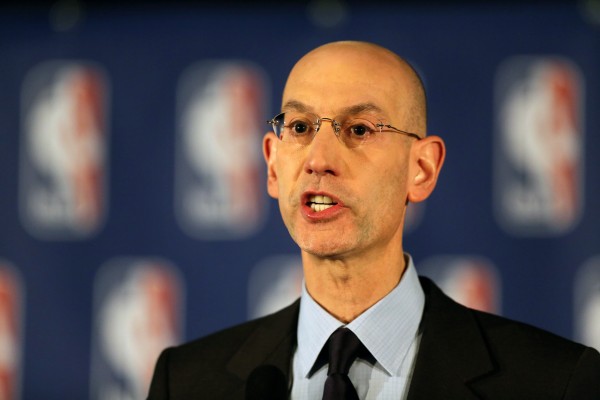Sports Betting is Too Popular to Ignore
MCT
NBA Commissioner Adam Silver understands how sports gambling can be lucrative. (Chris Pedota/The Record/VIA TNS)
October 5, 2015
Whether it’s legal or not, sports betting happens – in copious sums. According to the Nevada Gaming Commission, in 2011, $3.2 billion was legally wagered in Nevada on various sports games. Adam Silver, the commissioner of the National Basketball Association (NBA), estimated that nearly $400 billion is illegally wagered each year through underground sports betting agencies. While that number is most likely closer to $80 billion, sports gambling is an industry that can be very profitable.
New Jersey is the first state to attempt to legalize sports gambling in a move that many news outlets, including U.S. News and CNN, speculate is a response to the failing casino and racetrack industries. The state is hoping legal sports betting will reinvigorate its gaming industry, which is at a competitive disadvantage compared to Las Vegas. Club CalNeva doesn’t believe this idea is far-fetched. The Las Vegas-based analyst of trends in gaming estimated that legal sports gambling could bring New Jersey as much as $1.3 billion in gross revenues and $120 million in tax revenues. The introduction of sports wagering could also lead to thousands of new jobs for New Jersey, which is why residents voted 2-1 that they would like to see gambling on sports allowed in the state.
While sports betting can clearly be beneficial, the industry has a history cluttered with controversy. The most major of these scandals came at the hands of the infamous 1919 Chicago White Sox team. Eight White Sox ballplayers agreed to purposely lose the World Series in exchange for money from gamblers. As a result, all eight players were permanently banned from professional baseball. While other scandals have occurred over the years, this was clearly one of the most intricate ones to affect professional sports.
Even though it is generally believed that legalizing sports betting will only encourage more scandals, the legalization would allow for more regulation and protection for gamblers within the industry. According to the Chicago Tribune, currently, most sports gambling is untaxed and unregulated as gamblers will place bets with offshore operations who do not need to follow U.S. federal laws. By making sports wagering legal, lawmakers can ensure those betting on the games feel safe and protected, while limiting what is often scandalous behavior by offshore bookmakers who have a tendency to not pay out winnings.
Beyond increasing revenue and protecting bettors, bringing gambling into sports would rekindle the fans’ interest in games. Adam Silver addressed this when talking about the future of gambling in sports. “Everybody knows here that if you have a gentlemen’s bet or a small wager on any kind of sports contest, it makes you that much more…engaged in it,” Silver said last year at a sports forum. “That’s where we’re going to see it pay dividends.” Fans often complain that games are too boring; however, with increased risk, fans will be more passionate about their chosen teams and have more interest in the games.
Though sports gambling may coincide with controversy, the scandals surrounding betting on games existed when wagering was illegal and regulations can only limit these problems. Legalization can also be very profitable, specifically for states with high rates of gambling and declining economies. While much of the gambling industry is moving online, sports wagering could bring customers back to casinos and generate business in a weakened market. Gambling on sports would also garner more attention from the fans. We already see this with the growth of fantasy sports. Casual fans are now watching teams they would normally ignore, because a player happens to be on their fantasy team. Sports gambling is a large industry that is only growing and the government, fans and leagues can all benefit from its legalization.










